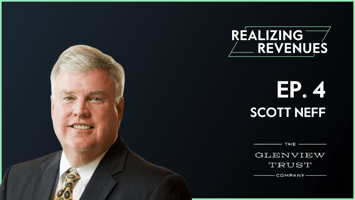In this episode, Scott Neff, President and CEO of The Glenview Trust Company talks with us about...
The Cost of Poor Service and Benefits of Emotionally Connected Clients
In the article titled “Happy Campers”, KISSmetrics found through a study that “Only 10% of companies had an ‘excellent’ service rating”. It’s tempting for many advisors and fiduciaries to think that their level of customer service is excellent, but the numbers tell a different story. Given that only one out of every ten companies achieve the highest possible level of customer service, the vast majority of businesses never reach an elite level. The question becomes, what happens if an organization doesn’t strive for, and achieve, the top level of customer service?
KISSmetrics goes on to say that “the cost of recovering a lost customer can be 6 to 7 times more expensive than the original cost of acquisition”. In addition to the opportunity cost of losing a valued customer, this study suggests that there is a monetary cost associated with losing customers due to poor service. The theme becomes evident here, in the fact that any wealth management company below the 90th percentile in customer service approval, is in danger of losing part of their book of business.
All is not lost, however, as the theory comes to light that emotionally connected customers are more likely to not only maintain the status quo with your business, but increase their expenditures, and investments with your business. Per KISSmetrics, “…a customer who is ‘emotionally connected’ to your place of business will spend 46% more money than someone who is ‘satisfied’ but not emotionally bonded”. The question then becomes, how does an advisor or fiduciary create a new level of bonding with their client?
In a market space focused on multi-generational wealth, financial advisors are in need of tools to strengthen, and fortify their client relationships. The KISSmetrics study goes on to say that “Consumers are also more likely to give repeat business after a good service experience (81%) than they are to never do business with a company again after a poor experience (52%)”. In many cases, the poor experience mentioned above can come from inactivity through a customer service perspective. The goal should be clear. Wealth management groups and fiduciaries should always seek to enter the elite space of customer service. The final question will be, what can be the advantage that will lift a financial advisory business into the elite level of customer service, and reap the benefits that come with this territory?



